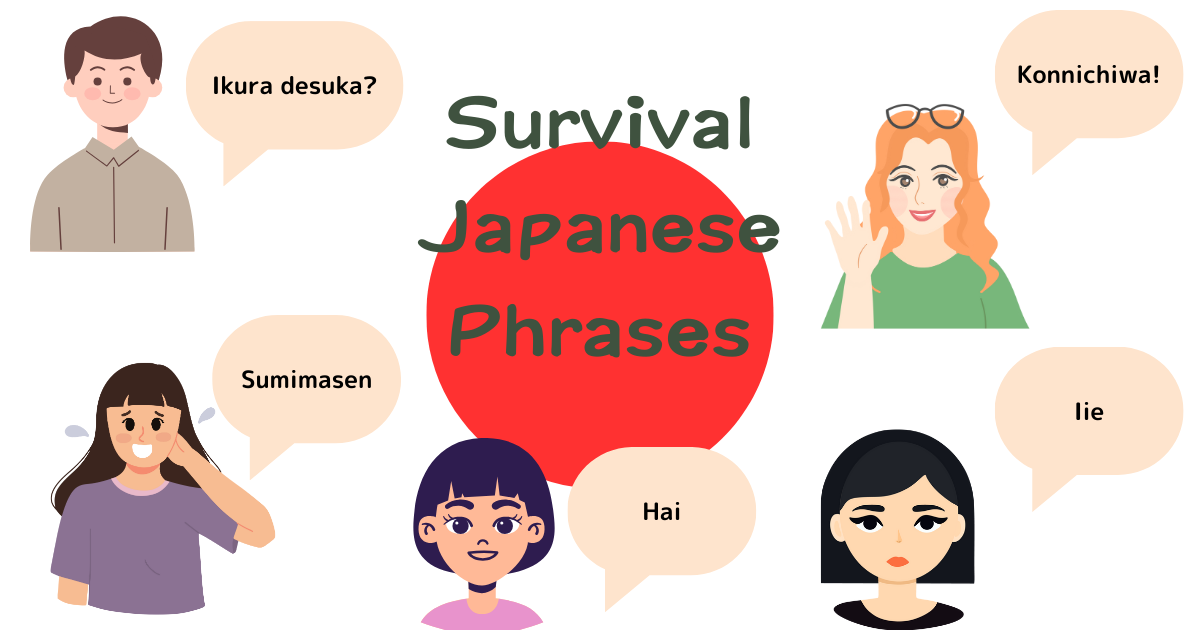Japan, with its stunning landscapes, rich culture, and delicious cuisine, is a very attractive destination for many travellers. When exploring this fascinating country, having a basic grasp of the local language can enhance your experience and help you connect with the locals on a deeper level. In this article, we’ll introduce essential survival Japanese phrases for first-time travellers to Japan.
- Hello (Konnichiwa) -こんにちは
- Thank you (Arigatou) -ありがとう
- Excuse Me / I’m Sorry (Sumimasen) -すみません
- How Much Is It? (Ikura desu ka?) -いくらですか?
- Where Is It? (Doko desu ka?) -どこですか?
- Can I have the Menu, Please? (Menyuu onegaishimasu) -メニューおねがいします
- Can I Have Some Water, Please? (Omizu kudasai) -おみずください
- Yes (Hai/Un) -はい/うん
- No (Iie/Uun) – いいえ/ううん
- I don’t understand (Wakarimasen) -わかりません
- The Final Word from me
Hello (Konnichiwa) -こんにちは

Upon arriving in Japan, the first phrase to use is a simple “Konnichiwa,” which means “hello.” It’s a very useful greeting suitable for use from morning until early evening.
Thank you (Arigatou) -ありがとう

Express gratitude with “Arigatou,” which means “thank you.” Use it after shopping or dining to show your appreciation.
Excuse Me / I’m Sorry (Sumimasen) -すみません

“Sumimasen” serves multiple purposes—it can mean both “excuse me” and “I’m sorry.” It’s handy for asking for directions or making requests in shops.
How Much Is It? (Ikura desu ka?) -いくらですか?

When shopping, this phrase comes in handy for asking about the price of items. It can be useful when bargaining.
Where Is It? (Doko desu ka?) -どこですか?

To ask about the location of tourist spots or your hotel, use the phrase “Doko desu ka?” You can even point to a map to clarify your question.
Can I have the Menu, Please? (Menyuu onegaishimasu) -メニューおねがいします

When dining out, requesting the menu is essential. Using “Menyuu onegaishimasu” while pointing to the menu is a straightforward way to do so.
Can I Have Some Water, Please? (Omizu kudasai) -おみずください

During meals, requesting water is common in Japan. “Omizu kudasai” is your go-to phrase.
‘Kudasai‘ is a very versatile phrase you must remember. When you’d like to ask for something in a shop or in a restaurant, you can just add ‘kudasai’ at the end.
For example, if you’d like to ask for a fork in a restaurant, you can say:
‘Fork (Fo-ku) kudasai’.
Yes (Hai/Un) -はい/うん

When you want to affirm or agree with something, simply say “Hai.” It’s a straightforward way to express your agreement or consent.
If you want to be more friendly with your Japanese friends, you can use “Un” to say “Yes”. Native Japanese speakers use “Un” when they’re having a conversation with their family or friends.

No (Iie/Uun) – いいえ/ううん

Conversely, if you want to decline or say “no,” use “Iie.” It’s a polite way to indicate a negative response.
Like “Un”, a casual version of “Yes”, there is a phrase “Uun” to say “no” if you want to sound like a more advanced Japanese user. You can use “Uun” to your friends and family.

I don’t understand (Wakarimasen) -わかりません

If you encounter a situation where you’re unsure or confused, use “Wakarimasen” to express that you don’t understand. I would imagine this phrase can be particularly helpful when dealing with complex instructions or conversations in Japanese.
The Final Word from me
Do you agree it’s nice to see a traveller trying to use your language when they’re in your country? I always feel I need to help them when I encounter those friendly ones.
Mastering these fundamental Japanese phrases can make your trip to Japan more enjoyable and fulfilling. Engaging with locals through these phrases enables you to create unforgettable memories. Don’t hesitate to put these phrases to use during your actual journey.
Lastly, if you have enjoyed reading this article, you may find my YouTube channel useful as well. I create short animations for you to learn Japanese characters in a fun way! Please stop by Animated Japanese.
Thank you very much for reading till the end and have an amazing time exploring Japan!



コメント